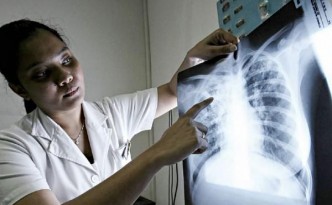Nigeria reports two new polio cases: WHO
Geneva (AFP) – The Nigerian government has reported two new polio cases in the first reemergence of the disease since 2014, the World Health Organization (WHO) said Thursday.
Geneva (AFP) – The Nigerian government has reported two new polio cases in the first reemergence of the disease since 2014, the World Health Organization (WHO) said Thursday.
(Reuters) – Brazil's Sports Minister Leonardo Picciani expects there to be almost no cases of the Zika virus during the 2016 Rio de Janeiro Olympics, adding that the country is prepared for the Games, despite health concerns and political instability. The World Health Organization's Emergency Committee on Zika will meet in the coming weeks to evaluate the risks associated with the event. U.S. health officials have concluded that infections by the mosquito-borne Zika virus in pregnant women can cause microcephaly, a birth defect marked by small head size that can lead to severe developmental problems in babies.

By Kate Kelland LONDON (Reuters) – The World Health Organization on Thursday recommended a speedier, cheaper treatment plan for patients with superbug forms of tuberculosis (TB) – a change that should help cure thousands of the killer disease. In what the WHO’s leading TB expert said was a critical step forward in tackling the “public health crisis” of multi drug-resistant tuberculosis (MDR-TB), the Geneva-based health agency said the new treatment plan could now be completed in 9-12 months rather than the two years previously recommended. The shorter treatment regimen also costs significantly less – at just under $1,000 per patient in developing countries, said Mario Raviglione, director of the WHO’s global TB program.
After three years of battling tuberculosis, a disease that claimed the lives of his father and younger brother, Sonu Verma, a patient in northern India, hopes a cure for his illness may be within reach. “Only a few more months and my nightmare will end… it will be my rebirth, free from tuberculosis,” the 25-year-old scrap dealer, who has been left visibly lean and weak by the disease, told AFP. As India marks World TB Day on Thursday, it faces an estimated 2.2 million new cases of the disease a year, more than any other country, according to the World Health Organisation.
Travelers coming back from any outbreak zones of the Zika virus will need to wait at least 28 days before giving blood to avoid any risk of transmission, French Health Minister Marisol Touraine said on Sunday. Zika, which is rapidly spreading through the Americas and has been declared a global health emergency by the World Health Organisation (WHO), is primarily transmitted through mosquito bites. “Someone who comes from a zone where there is Zika can not give blood for 28 days,” Touraine said in an interview with Europe 1 radio, news channel iTele and Le Monday daily.
By Tom Miles and Stephanie Nebehay GENEVA (Reuters) – The Zika virus, linked to severe birth defects in thousands of babies in Brazil, is “spreading explosively” and could infect as many as 4 million people in the Americas, the World Health Organization (WHO) said on Thursday. Director-General Margaret Chan told members of the U.N. health agency's executive board the spread of the mosquito-borne disease had gone from a mild threat to one of alarming proportions. “The level of alarm is extremely high,” Chan told the Geneva gathering.
Sierra Leone's Health Ministry said on Thursday it was investigating a suspected Ebola death in Tonkolili district, hours after the World Health Organization said transmission of the virus in West Africa had ended. “A suspected Ebola death has been reported in Tonkolili district today,” said a note sent by the ministry to health officials in the country and seen by Reuters.
DAKAR, Senegal (AP) — Guinea has been declared free from transmission of Ebola, the World Health Organization said Tuesday, marking a milestone for the West African country where the original Ebola chain of transmission began two years ago leading to the largest epidemic in history.
South Korea announced on Wednesday the official end to a deadly outbreak of Middle East Respiratory Syndrome (MERS) that killed 36 people and sparked widespread panic in Asia's fourth-largest economy. World Health Organization standards call for a four-week waiting period after the last MERS patient fully recovers before an outbreak can definitively be said to be over. The virus infected 186 people, with nearly 17,000 people confined to their homes and thousands of schools temporarily closing at the peak of the largest MERS outbreak outside Saudi Arabia, where it first appeared in 2012.
Antibiotic resistance, which can turn common ailments into killers, has reached dangerous levels worldwide, the World Health Organization warned Monday, saying users still know too little about how antibiotics work. Antibiotic resistance happens when bugs become immune to existing drugs, allowing minor injuries and common infections to become deadly. Overuse and misuse of the drugs increases this resistance, but WHO also published a survey of 10,000 people worldwide showing a range of dangerous misconceptions about the threat, which are allowing it to prosper.